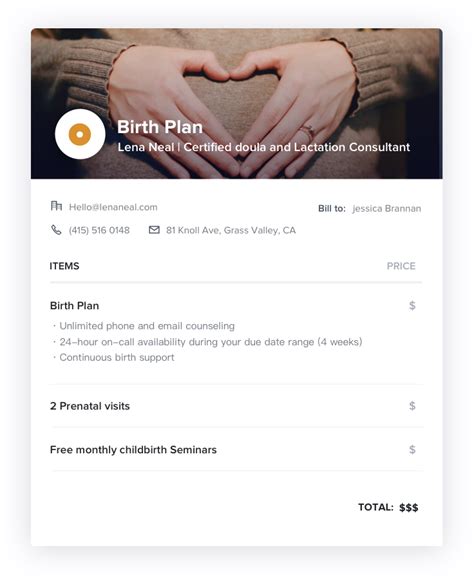Financial Planning for Doulas in North Carolina: A Comprehensive Guide
Becoming a doula in North Carolina is a rewarding career path, offering the chance to support families during a pivotal life event. However, building a successful and sustainable doula business requires careful financial planning. This comprehensive guide outlines key financial strategies specifically tailored for doulas in North Carolina.
What are the unique financial challenges faced by North Carolina doulas?
North Carolina's doula landscape, like many others, presents a unique set of financial considerations. Income can be unpredictable, depending on client volume and service offerings. Additionally, navigating the regulatory landscape and understanding applicable taxes are crucial for financial stability. Many doulas work independently, requiring them to handle all aspects of their business, including marketing, bookkeeping, and insurance. Understanding these challenges is the first step to overcoming them.
How to Set Up Your Business Financially: Budgeting and Pricing
One of the first steps is creating a realistic budget. This should include start-up costs like training, certification, insurance, marketing materials, and any necessary equipment. Factor in ongoing expenses such as professional development, website maintenance, and potential membership fees for doula organizations. Accurately pricing your services is vital. Consider your expenses, desired income, and the market rates in your area of North Carolina. Don't undervalue your expertise! Researching competitor pricing and understanding the value you provide are essential for setting competitive yet profitable rates.
What are the average start-up costs for a doula in NC?
Start-up costs can vary significantly, but expect to invest in:
- Certification/Training: This is a significant upfront cost, ranging from several hundred to several thousand dollars depending on the program and its length.
- Insurance: Professional liability insurance is a must-have to protect your business from potential lawsuits. Costs vary by provider and coverage level.
- Marketing & Website: Creating a professional website and marketing materials (business cards, brochures, etc.) is essential for attracting clients.
- Continuing Education: Keeping your skills and knowledge up-to-date requires ongoing investment in professional development courses and workshops.
Managing Your Income and Taxes as a Doula in North Carolina
Maintaining accurate financial records is paramount. Use accounting software or work with a bookkeeper to track income, expenses, and mileage. Understanding your tax obligations as a self-employed individual in North Carolina is crucial. You'll need to pay self-employment taxes, including Social Security and Medicare taxes, in addition to income taxes. Consider consulting with a tax professional who understands the specific tax implications for self-employed individuals in the state.
What taxes do I need to pay as a North Carolina doula?
As a self-employed individual, you'll be responsible for:
- Federal and State Income Taxes: These are based on your net income (income minus expenses).
- Self-Employment Taxes: These cover Social Security and Medicare taxes, which are typically higher for self-employed individuals than for those with traditional employment.
- Sales Tax (if applicable): Depending on your specific services and how you structure your business, you may need to collect and remit sales tax.
Building a Financial Safety Net: Savings and Insurance
Financial stability requires building a safety net. Aim to save a portion of your earnings to cover unexpected expenses or periods of low client volume. Consider establishing an emergency fund to cover several months of living expenses. Beyond savings, comprehensive professional liability insurance is essential to protect against potential claims related to your services. Review your policy regularly and ensure it adequately covers your services and risk level.
How much should I save as a doula in North Carolina?
The amount you should save depends on your individual circumstances and financial goals. However, building an emergency fund covering 3-6 months of living expenses is a prudent goal. Regularly contributing to savings, even small amounts, can significantly impact your financial security over time.
Long-Term Financial Planning for Doulas
Think long-term. Consider retirement planning options, such as a SEP IRA or Solo 401(k), which are suitable for self-employed individuals. Investing in your professional development is also a long-term financial investment that can increase your earning potential. Staying abreast of changes in the healthcare landscape and the doula profession will enhance your ability to adapt and thrive.
This guide provides a starting point for financial planning as a doula in North Carolina. Remember to seek advice from financial professionals who specialize in working with self-employed individuals to ensure you make informed decisions that support your financial well-being and the long-term success of your doula practice.

